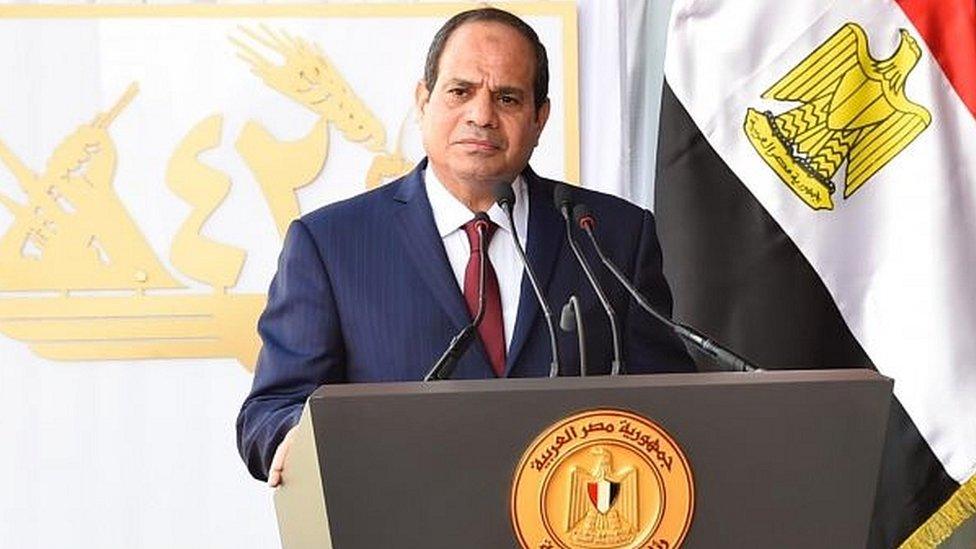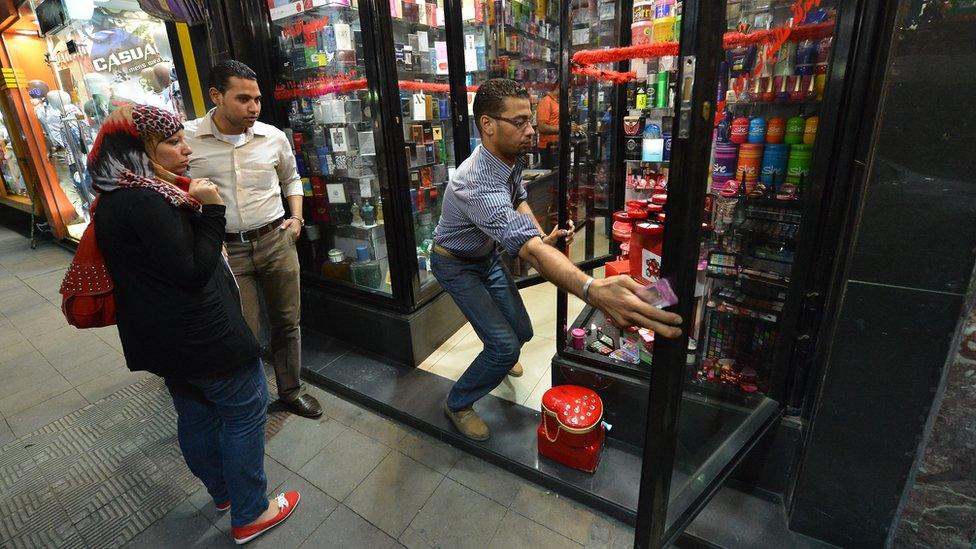Egypt's Sisi UK visit puts spotlight on human rights
- Published

Abdel Fattah al-Sisi is visiting the UK at a time of concern over Egypt's human rights record
When President Abdul Fattah al-Sisi makes his first visit to the UK, Mohamed Lotfy will be watching - back in Cairo.
The Egyptian human rights activist can't travel himself. The authorities confiscated his passport in June when he tried to fly to Germany, during the president's visit there, to discuss human rights.
He got off lightly, he says, by only getting a travel ban.
Other leading activists here won't be following the visit because they are in jail - among them icons of the 2011 revolution.
"We have never had such a dismal situation for human rights," says the renowned Egyptian author and activist Ahdaf Soueif. "It's the worst it's ever been."
Her nephew, Alaa Abdel Fattah, is one of the key figures from the uprising who are now behind bars.
Egyptian author and activist Ahdaf Soueif: "The attitude of the British government is not helpful"
The prominent blogger and pro-democracy activist has just marked one year in jail, and is due to serve four more, for attending an illegal demonstration.
Ms Soueif - who is a citizen of Egypt and the UK - says that by hosting President Sisi, Britain will strengthen an authoritarian regime.
"I think it definitely sends the wrong message," she says, "because the regime needs acceptance, and if it has acceptance when it's disappearing people from the streets, and giving people ridiculous jail sentences and allowing people to die in prison for lack of medical attention - then it's definitely the wrong message."
Brutal crackdown
The previous Egyptian President, Mohammed Morsi of the Muslim Brotherhood, was also invited to the UK, but was ousted before he could make the trip.
Mr Sisi, then armed forces chief, removed him in 2013, after massive public protests, in what many regard as a coup.
Now he and most of those who would have accompanied him are behind bars.
Morsi - who was Egypt's first democratically elected president - is a one of hundreds of Islamists sentenced to death in summary mass trials.
That is part of a brutal campaign to crush dissent in which more than 1,000 protestors, mostly Islamists, have been killed on the streets.
Egyptian Ambassador to the UK, Nasser Kamel: "Egypt and [the] UK are talking closely to each other [about] so many issues"
As many as 40,000 people are estimated to have been detained in recent years. The US-based Human Rights Watch describes the crackdown as "ferocious".
Egyptian officials - in Cairo and London - deny that the Arab world's most populous nation has returned to the repression of the past.
Nasser Kamel, Ambassador to the UK, accused human rights groups of siding with the now-banned Muslim Brotherhood.
"We know where those campaigns are coming from," said Mr Kamel, "and we know they are politically tainted, in a way reflecting a point of view of a certain group, or view, of the Brotherhood in Egypt.
"Egypt is a state of law, has been applying the law, respecting the law."
The ambassador prefers to emphasise the common ground between the two countries.
"We are partners in the war against Isil [so-called Islamic State]," he told the BBC, "we are partners in the war against terrorism at large.
"Egypt and UK are talking closely to each other concerning so many issues like the crisis in Libya and the situation in Syria."
Trade ties
Egypt presents itself as a beacon of stability in a volatile region.
And it has another selling point - it is an attractive market for British businesses.
In Cairo shopping centres there are big name British brands - from Topshop to Debenhams and Marks and Spencer.
But the UK's interests extend beyond retail - to oil and gas, pharmaceuticals and construction. Britain has a great deal at stake here. It is the biggest foreign investor in Egypt.

Egypt's growing population is a key market for the UK
The opportunities are expanding with the nation, according to Cairo-based investment consultant Angus Blair, of the Signet Institute.
In the next 15 years, Egypt's population of 90 million is expected to swell to around 120 million.
"That will be a major drain on the government," Mr Blair said, "but it will also provide enormous opportunities for investors because the consumer sector is growing.
"There's a lot of money around in supermarkets and shopping malls. People are looking to spend."
So when the prime minister sits down with the Egyptian leader, they will have plenty to discuss - from business interests to conflict in the Middle East.
Downing Street says the stronger the working relationship, the more there can "be necessary and frank discussions on areas of disagreement".
Activists hope President Sisi's human rights record will not be swept under the red carpet.